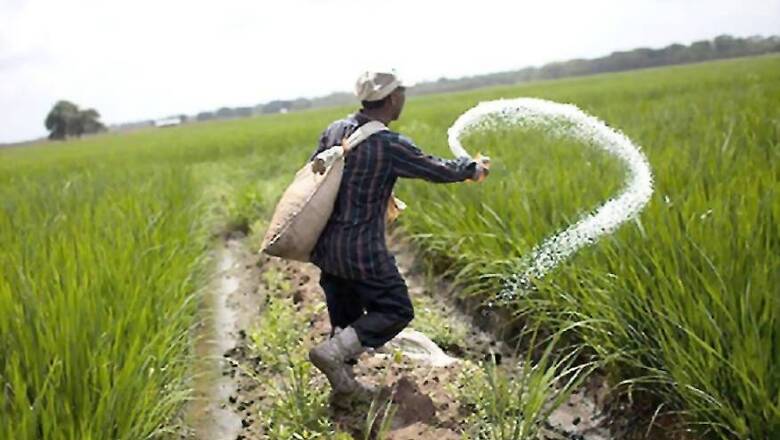
views
New Delhi: eNAM, a pan-India electronic trading portal that was launched on April 14, 2016 by Prime Minister Narendra Modi to help network the existing mandis to 'One Nation, One Market' for agricultural commodities, has come a long way as it celebrates its fourth anniversary today.
Small Farmers Agribusiness Consortium (SFAC) is the lead agency for implementing eNAM under the aegis of Ministry of Agriculture and Farmers’ Welfare, Government of India.
SFAC works with a vision of Promoting Agri-Business by encouraging institutional and private sector investments through linkages with farmers to ensure their empowerment in the country.
The eNAM (electronic National Agriculture Market), one of the most successful of Digital India’s initiatives, provides a single window service for all APMC-related information and services, which includes commodity arrivals, quality and prices, provision to respond to trade offers and electronic payment settlement directly into farmers’ accounts.
This online market aims at reducing transaction costs, bridging information asymmetries, and helping expansion of market access for farmers.
At present, there is a network of 585 mandis integrated with e-NAM across 16 states and two UTs, with user base of 1.66 crore farmers, 1.28 lakh traders and 70,934 commission agents.
As of March 31, 2020, the total volume of 3.39 crore MT & 37 lakh numbers (bamboo & coconut) that collectively cost approximately Rs 1 lakh crore has been traded on e-NAM platform.
The compound average growth rate (CAGR) in the last four years has been 28% and 18% in value and volume terms respectively.
Further, digital transactions of more than Rs 662 crore have been carried out during e-NAM transactions, benefiting more than 1,17,849 farmers.
The e-NAM facilitates trade beyond mandi/state borders. A total of 228 mandis participated in inter-mandi trade across 12 states, whereas 13 states have participated in the inter-state trade allowing farmers to interact directly with distantly located traders.
An average of 3.6 bids is made for each lot in this financial year. An increased average bid per lot is an indicator of increase in competitiveness amongst buyers, thereby assuring better price discovery for the farmers to boost their income.
Also, quality assaying has gained significant pace which shows that farmers would be in a position to obtain prices based on the quality of their produce. Till date, about 83.24 lakh lots have been assayed on eNAM.
At present, 150 commodities, including food grains, oilseeds, fibers, vegetables and fruits, are traded on eNAM. Also, about 977 FPOs are integrated with e-NAM platform, out of which 10% of FPOs have already started trading on the platform.
The features available on e-NAM platform benefit various stakeholders, especially farmers. A robust mobile app and website is available in nine languages and is equipped with a GPS-based mandi locator for searching mandis within a radius of 100 kms.
Using e-NAM, farmers can track progress of bids for their lot being traded through mobile. They can also get real time information about prevailing commodity prices in nearby mandis.
It is also enabled with advanced gate entry, sampling and assaying reports. Weighbridges and electronic weighing scales have been integrated with eNAM platform to have transparency and error-free weighment of commodities.
Online payment to farmers by traders can also be done online through mobile app via-BHIM UPI, debit card and NEFT.
Traders can use advance features like viewing quality certificate, push notification, bunching of invoices, shopping cart features etc.
Also, a 360-degree image of the commodity lots via mobile is made available for better decision making while online bidding, using eNAM mobile app.
APMC officials, traders and other stake holders have been trained to assist in catalysing digital transformation of mandi operations.
Also, Business Intelligence (BI) dashboard is available for better monitoring and decision making for the APMC officials.
During the testing times and lockdown period of Covid-19 crisis, this transformational scheme of central government, eNAM, has provided a unique trading platform which not only helps in decongesting the APMC premises through a transparent system of assaying, electronic bidding and online payment facility, but also ensures better and remunerative prices to the farmers.
In addition to the constant feedback-based improvements in the eNAM platform over the last couple of years, following three features were launched on April 2, 2020, enhancing the effectiveness of eNAM to help mitigate the unprecedented nature of challenges faced by stakeholders during lockdown:
• FPO Module: This module is developed to allow FPOs for uploading of details of produce from their collection centres. This will not only decongest the mandis but also reduce the logistics cost for the FPOs and hence benefit the farmers eventually.
• Warehouse (eNWR) based Trading: It provides immediate relief for the Rabi crop farmers due to logistics challenges in the short run due to Covid-19. This module enables small and marginal farmers to directly trade their stored produce from selected WDRA registered warehouses which are declared deemed markets by the state.
So far, Telangana (14 warehouses) and Andhra Pradesh (23 warehouses) have declared designated warehouses as deemed markets. SFAC is working with state governments to motivate them to bring in similar changes/amendments.
• Logistics Module: It links logistic aggregators’ platforms with eNAM platform. Traders can use the link to navigate to the logistics service provider’s website and avail the offerings of registered service providers. Currently, more than 7.76 lakh trucks are available with the eNAM platform. This will help in seamless transportation of agriculture produce at competitive rates.
• eNAM Call Centre: The call centre -18002700224 has been strengthened and expanded in order to facilitate logistics arrangements and related grievances for farmers/FPOs/traders.
Looking to the success of eNAM in its Phase-I, 585 mandis, it is now on a path of expansion with additional 415 mandis being onboard, taking the total number of eNAM mandis to 1,000 across 21 states/UTs, moving further towards the objective of 'One Nation One Market' for agricultural commodities in India.
Also, with objective to achieve real-time payments to farmers, eNAM would soon be on-boarding more banks to broad base farmers’ and traders’ banking options.
The eNAM is bringing transformational changes to the way traditional agri-businesses were conducted in the country and has emerged as a dynamic solution for farmers and other stakeholders to conduct their business.
With its value-added services, eNAM as a whole has evolved as a robust and advanced platform to achieve the dream of removing information asymmetries and help farmers get competitive and remunerative prices for their produce.
(Neelkamal Darbari is an IAS officer and managing director at Small Farmers' Agribusiness Consortium. Views expressed are personal.)


















Comments
0 comment